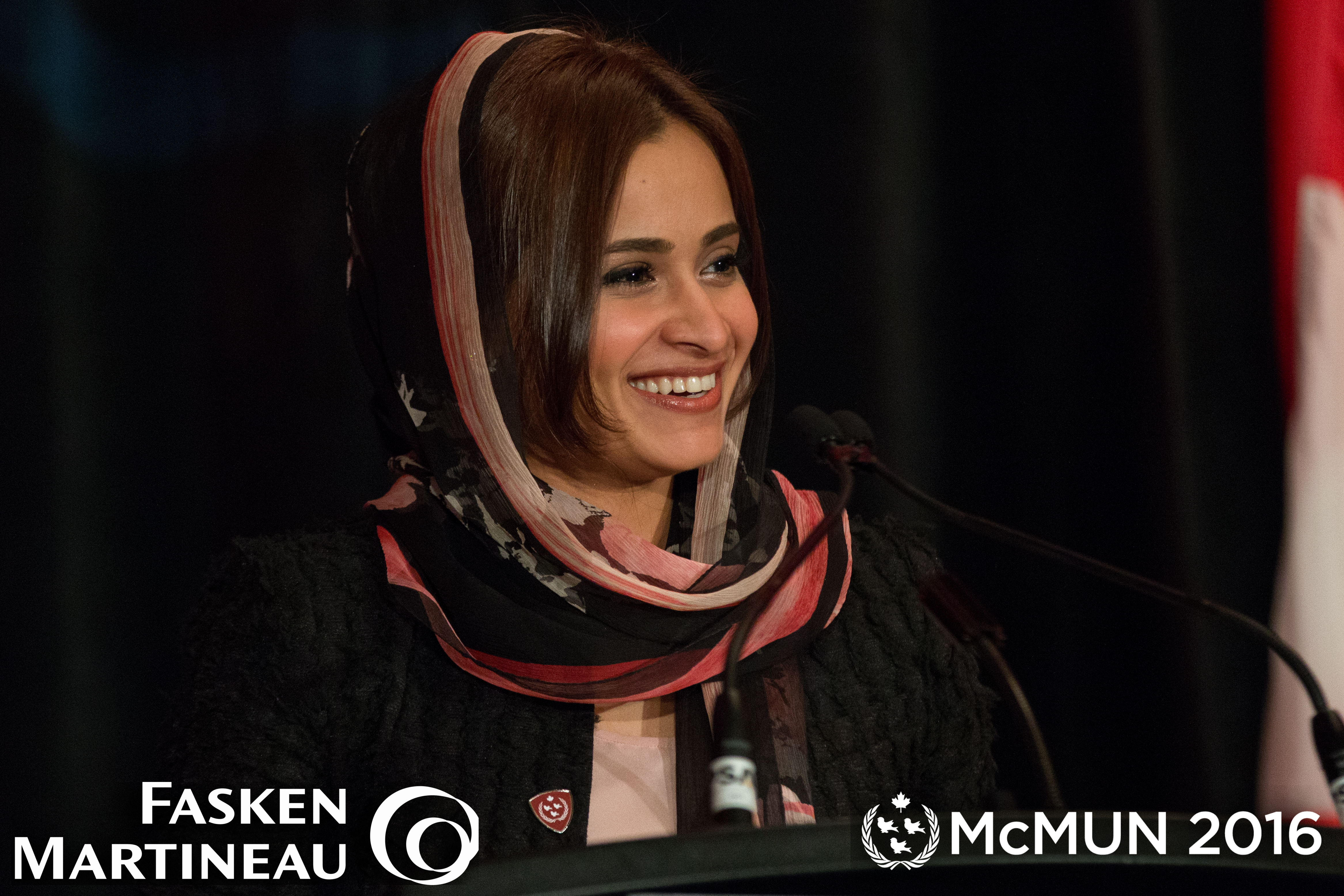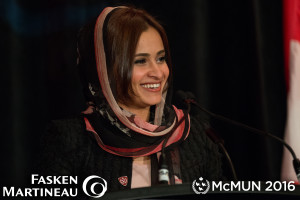Passing the Torch: An Interview with Captain Aysha Al Hamili

During the opening ceremonies of the 2016 McGill Model United Nations Conference (McMUN), keynote speaker Captain Aysha Al Hamili spoke extensively on the resounding impact that young people can have on the world. As the first female pilot to emmerge from the UAE and the youngest ever permanent representative to the International Civil Aviation Organization Council (ICAO), Capt. Al Hamili is emblematic of the values she shared with our McMUN delegates, illustrating that luck and coincidence cannot be considered as driving forces on a meaningful career path. The McGill International Review was fortunate enough to interview this inspirational woman, allowing Capt. Al Hamili the opportunity to expand on her thoughts surrounding youth involvement in aviation, the global community, and the McMUN itself.

During an interview at the2014 Global Aerospace Summit, you mentioned that one of your favourite tasks was talking with students. Why does engaging with the next generation persist as such an important issue for you?
Well, I don’t see students as students, I see them as the next generation who will carry the torch, and someone needs to give them that torch. For me, that torch is inspiring them and leading them to come and work in aviation in general, which lacks the young generation. At some point, we are going to have a severe shortage of pilots, engineers and lawyers in aviation. So for me it is important to be young, I feel it is a responsibility because sometimes, when you speak to people who are close to you in age, you can inspire them to enter that field. I believe I have this ability and I would love to see more people, especially the younger generation, enter the field of aviation.
What are your thoughts on McMUN and Model United Nations (MUN) as a whole? What skills and lessons should delegates look to take away from this experience?
Firstly, I believe that the Model United Nations builds the next generation of professionals. It exposes those who are still not sure what to do in life to the opportunities that are out there for them, not just local opportunities but international as well. It is a starting point, and this is how you expose them. It helps them being a part of this process, it will teach them a lot of skills that they will learn with time, but this is an introduction to lobbying, negotiations, building cases, and it helps in networking. Ultimately, if one or two people out of this conference join the United Nations, they will cross paths at some point, and networking is very important, because you never know when these paths will cross. Finally, MUN is crucial for personal relationships. No matter what technology or information we have, regardless of who we are, it is important to get together, one on one, physically, to interact. At the end of the day, we are human, and it is a skill to be able to appreciate this time.
As a permanent representative at the International Civil Aviation Organization (ICAO), you have led nearly countless international air services negotiations. In your career, you must have encountered many challenges whilst attempting to see certain policies passed, all while mediating the needs of different interest groups in a highly dynamic market. While MUN is only a simulation, it incorporates similar bureaucratic obstacles and challenges that are routinely faced when dealing with international negotiations. Do you have any advice for our delegates concerning the challenges of negotiating and getting your voice heard?
Firstly, remember that we are all humans. When we negotiate, we are emotional animals, so in the end we go back to the basics. Number one: build your case, have a strong case because the other party needs to know the reasons behind your negotiation. Second: learn how to lobby. Once you have your case, you need to lobby, because one voice in an international system, or even in negotiating, does not mean anything. Identify your negotiation power. When you know what power you have over the other party, build a platform around that. Make sure that when you are done negotiating, both parties win, because in an international negotiation, or any negotiation, if one party feels like they lose, they will never make a deal with you again. They will not trust you, and trust is very important in an international arena. There can be no loser in a negotiation. Furthermore, make sure that you keep your credibility at all times. Once you lose your credibility, which basically means that you negotiate with one party and you do not respect what you promised, you lose credibility, and once you lose credibility in an international arena, it is very difficult to rebuild.
During a speech that you made at the Emirates Aviation College in 2012, you emphasized the importance of sharing information in the aviation industry, especially when faced with obstacles such as threats to security and terrorism. Over this upcoming weekend, delegates will be faced with hot topic issues and will attempt to “resolve” them in an effective and diplomatic manner. What do you find most effective for maintaining an open and diplomatic dialogue when dealing with potentially sensitive subject matter?
Again, I am going to go back to personality and human interactions. It is not only about the case, it is about the people involved in the case, so identify and get to know the other party you are negotiating with. Second, if that party refuses to cooperate and you get the impression that there is no way to negotiate with them, or if it proves very difficult to reach an agreement, get a neutral third party to mediate. Mediation works in a lot of cases, especially if the two parties have a great relationship with a third party who has no interest in winning or losing. Within the UN system in particular, seek the regional groups’ assistance, advice or support. It is the number that matters in most cases, not the veto power you have. When you have regions, and the majority supports your case, it becomes very difficult even for the more powerful countries to go ahead with their plan. So identify the regions: it is easier to talk to regions rather than individual parties. Identify groupings that you can communicate with, and target the largest number of the other party. Be transparent. Do not lie; you can hide things, but you cannot lie. Be careful with what you reveal, because nowadays you cannot hide anything, and again that comes down to the importance of credibility. Transparency is very important, especially now with the new generation: they are more informed, and they do not want to be tricked or lied to.
“Global Community” is a buzzword that millennials have grown up with, but are still in the arduous process of giving meaning to. What is the “global community” for you, and how can we make sure that it is well represented within international organizations, such as the UN and ICAO?
For me, a “global community” is a community that is well represented, one that is able to give a voice to every region and every country. Normally, the UN is the best platform for this, because you have the General Assembly where every voice is heard, and then you have the other groups, like the UN Council, where things are done differently, but you still have that representation. Coming from the ICAO, we have a very similar thing. In our General Assembly, we have 192 member states, and we make sure that whatever regulation and standards we set, they do not harm any country, and we involve everybody in the decision making process, one way or another. The assembly is a way to communicate and share our strategies; then there is the Council.
Now, the Council of the ICAO is very unique. It has 36 members, divided into three categories. The first category is for the major players in aviation and the second category is for the biggest air navigation services. The third one, which is really interesting, is where geographical representation plays a role. This means that if you are not represented by a big industrial conglomerate or by a major air navigation service, you are still part of a group where every region is represented, and every country has a turn on the Council to make a difference or to be part of the decision-making process. I think the ICAO and the UN are striving to involve every nation and every gender in the decision-making process and help them in any way possible. So for me, “global community” means equal representation.
Photo credits to McMUN/Matthew Fong
